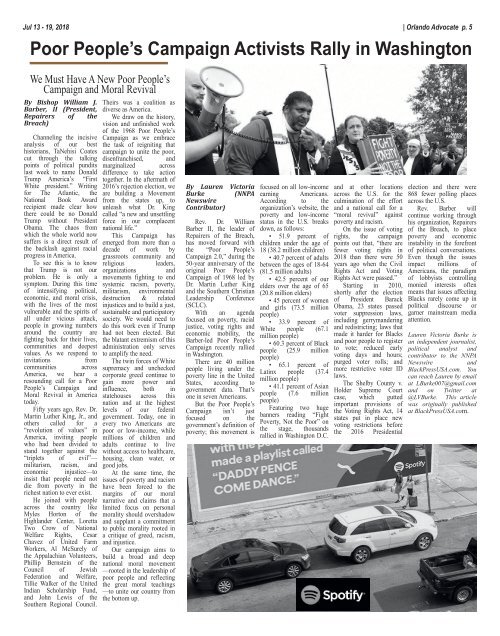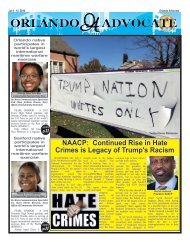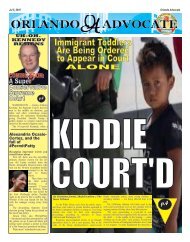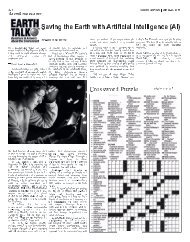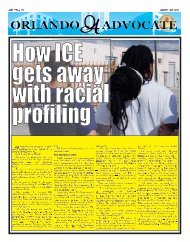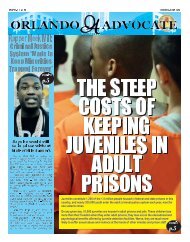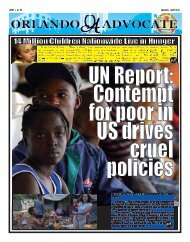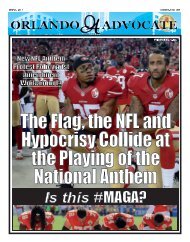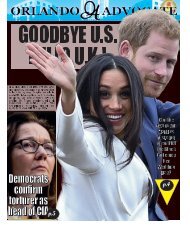2018-07-13
Create successful ePaper yourself
Turn your PDF publications into a flip-book with our unique Google optimized e-Paper software.
Jul <strong>13</strong> 19, <strong>2018</strong> | Orlando Advocate p. 5<br />
Poor People’s Campaign Activists Rally in Washington<br />
We Must Have A New Poor People’s<br />
Campaign and Moral Revival<br />
By Bishop William J.<br />
Barber, II (President,<br />
Repairers of the<br />
Breach)<br />
Channeling the incisive<br />
analysis of our best<br />
historians, TaNehisi Coates<br />
cut through the talking<br />
points of political pundits<br />
last week to name Donald<br />
Trump America’s “First<br />
White president.” Writing<br />
for The Atlantic, the<br />
National Book Award<br />
recipient made clear how<br />
there could be no Donald<br />
Trump without President<br />
Obama. The chaos from<br />
which the whole world now<br />
suffers is a direct result of<br />
the backlash against racial<br />
progress in America.<br />
To see this is to know<br />
that Trump is not our<br />
problem. He is only a<br />
symptom. During this time<br />
of intensifying political,<br />
economic, and moral crisis,<br />
with the lives of the most<br />
vulnerable and the spirits of<br />
all under vicious attack,<br />
people in growing numbers<br />
around the country are<br />
fighting back for their lives,<br />
communities and deepest<br />
values. As we respond to<br />
invitations<br />
from<br />
communities across<br />
America, we hear a<br />
resounding call for a Poor<br />
People’s Campaign and<br />
Moral Revival in America<br />
today.<br />
Fifty years ago, Rev. Dr.<br />
Martin Luther King, Jr., and<br />
others called for a<br />
“revolution of values” in<br />
America, inviting people<br />
who had been divided to<br />
stand together against the<br />
“triplets of evil”—<br />
militarism, racism, and<br />
economic injustice—to<br />
insist that people need not<br />
die from poverty in the<br />
richest nation to ever exist.<br />
He joined with people<br />
across the country like<br />
Myles Horton of the<br />
Highlander Center, Loretta<br />
Two Crow of National<br />
Welfare Rights, Cesar<br />
Chavez of United Farm<br />
Workers, Al McSurely of<br />
the Appalachian Volunteers,<br />
Phillip Bernstein of the<br />
Council of Jewish<br />
Federation and Welfare,<br />
Tillie Walker of the United<br />
Indian Scholarship Fund,<br />
and John Lewis of the<br />
Southern Regional Council.<br />
Theirs was a coalition as<br />
diverse as America.<br />
We draw on the history,<br />
vision and unfinished work<br />
of the 1968 Poor People’s<br />
Campaign as we embrace<br />
the task of reigniting that<br />
campaign to unite the poor,<br />
disenfranchised, and<br />
marginalized across<br />
difference to take action<br />
together. In the aftermath of<br />
2016’s rejection election, we<br />
are building a Movement<br />
from the states up, to<br />
unleash what Dr. King<br />
called “a new and unsettling<br />
force in our complacent<br />
national life.”<br />
This Campaign has<br />
emerged from more than a<br />
decade of work by<br />
grassroots community and<br />
religious leaders,<br />
organizations and<br />
movements fighting to end<br />
systemic racism, poverty,<br />
militarism, environmental<br />
destruction & related<br />
injustices and to build a just,<br />
sustainable and participatory<br />
society. We would need to<br />
do this work even if Trump<br />
had not been elected. But<br />
the blatant extremism of this<br />
administration only serves<br />
to amplify the need.<br />
The twin forces of White<br />
supremacy and unchecked<br />
corporate greed continue to<br />
gain more power and<br />
influence, both in<br />
statehouses across this<br />
nation and at the highest<br />
levels of our federal<br />
government. Today, one in<br />
every two Americans are<br />
poor or lowincome, while<br />
millions of children and<br />
adults continue to live<br />
without access to healthcare,<br />
housing, clean water, or<br />
good jobs.<br />
At the same time, the<br />
issues of poverty and racism<br />
have been forced to the<br />
margins of our moral<br />
narrative and claims that a<br />
limited focus on personal<br />
morality should overshadow<br />
and supplant a commitment<br />
to public morality rooted in<br />
a critique of greed, racism,<br />
and injustice.<br />
Our campaign aims to<br />
build a broad and deep<br />
national moral movement<br />
—rooted in the leadership of<br />
poor people and reflecting<br />
the great moral teachings<br />
—to unite our country from<br />
the bottom up.<br />
By Lauren Victoria<br />
Burke (NNPA<br />
Newswire<br />
Contributor)<br />
Rev. Dr. William<br />
Barber II, the leader of<br />
Repairers of the Breach,<br />
has moved forward with<br />
the “Poor People’s<br />
Campaign 2.0,” during the<br />
50year anniversary of the<br />
original Poor People’s<br />
Campaign of 1968 led by<br />
Dr. Martin Luther King<br />
and the Southern Christian<br />
Leadership Conference<br />
(SCLC).<br />
With an agenda<br />
focused on poverty, racial<br />
justice, voting rights and<br />
economic mobility, the<br />
Barberled Poor People’s<br />
Campaign recently rallied<br />
in Washington.<br />
There are 40 million<br />
people living under the<br />
poverty line in the United<br />
States, according to<br />
government data. That’s<br />
one in seven Americans.<br />
But the Poor People’s<br />
Campaign isn’t just<br />
focused on the<br />
government’s definition of<br />
poverty; this movement is<br />
focused on all lowincome<br />
earning Americans.<br />
According to the<br />
organization’s website, the<br />
poverty and lowincome<br />
status in the U.S. breaks<br />
down, as follows:<br />
• 51.9 percent of<br />
children under the age of<br />
18 (38.2 million children)<br />
• 40.7 percent of adults<br />
between the ages of 1864<br />
(81.5 million adults)<br />
• 42.5 percent of our<br />
elders over the age of 65<br />
(20.8 million elders)<br />
• 45 percent of women<br />
and girls (73.5 million<br />
people)<br />
• 33.9 percent of<br />
White people (67.1<br />
million people)<br />
• 60.3 percent of Black<br />
people (25.9 million<br />
people)<br />
• 65.1 percent of<br />
Latinx people (37.4<br />
million people)<br />
• 41.1 percent of Asian<br />
people (7.6 million<br />
people)<br />
Featuring two huge<br />
banners reading “Fight<br />
Poverty, Not the Poor” on<br />
the stage, thousands<br />
rallied in Washington D.C.<br />
and at other locations<br />
across the U.S. for the<br />
culmination of the effort<br />
and a national call for a<br />
“moral revival” against<br />
poverty and racism.<br />
On the issue of voting<br />
rights, the campaign<br />
points out that, “there are<br />
fewer voting rights in<br />
<strong>2018</strong> than there were 50<br />
years ago when the Civil<br />
Rights Act and Voting<br />
Rights Act were passed.”<br />
Starting in 2010,<br />
shortly after the election<br />
of President Barack<br />
Obama, 23 states passed<br />
voter suppression laws,<br />
including gerrymandering<br />
and redistricting; laws that<br />
made it harder for Blacks<br />
and poor people to register<br />
to vote; reduced early<br />
voting days and hours;<br />
purged voter rolls; and<br />
more restrictive voter ID<br />
laws.<br />
The Shelby County v.<br />
Holder Supreme Court<br />
case, which gutted<br />
important provisions of<br />
the Voting Rights Act, 14<br />
states put in place new<br />
voting restrictions before<br />
the 2016 Presidential<br />
election and there were<br />
868 fewer polling places<br />
across the U.S.<br />
Rev. Barber will<br />
continue working through<br />
his organization, Repairers<br />
of the Breach, to place<br />
poverty and economic<br />
instability in the forefront<br />
of political conversations.<br />
Even though the issues<br />
impact millions of<br />
Americans, the paradigm<br />
of lobbyists controlling<br />
monied interests often<br />
means that issues affecting<br />
Blacks rarely come up in<br />
political discourse or<br />
garner mainstream media<br />
attention.<br />
Lauren Victoria Burke is<br />
an independent journalist,<br />
political analyst and<br />
contributor to the NNPA<br />
Newswire<br />
and<br />
BlackPressUSA.com. You<br />
can reach Lauren by email<br />
at LBurke0<strong>07</strong>@gmail.com<br />
and on Twitter at<br />
@LVBurke. This article<br />
was originally published<br />
at BlackPressUSA.com.


